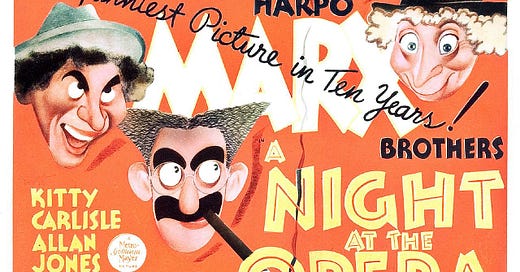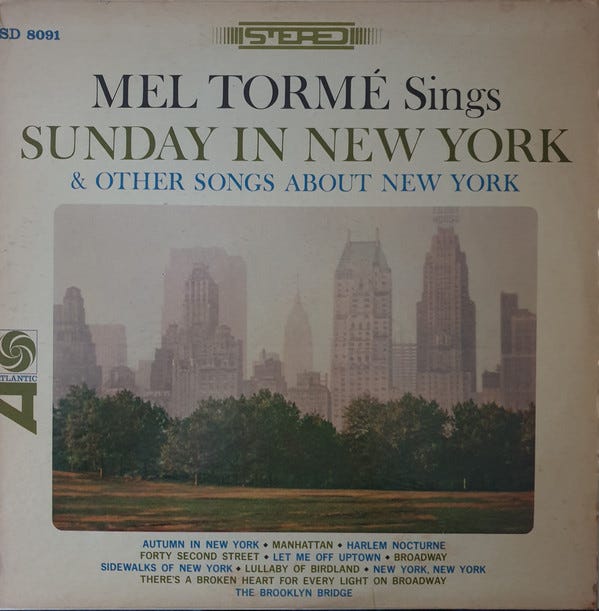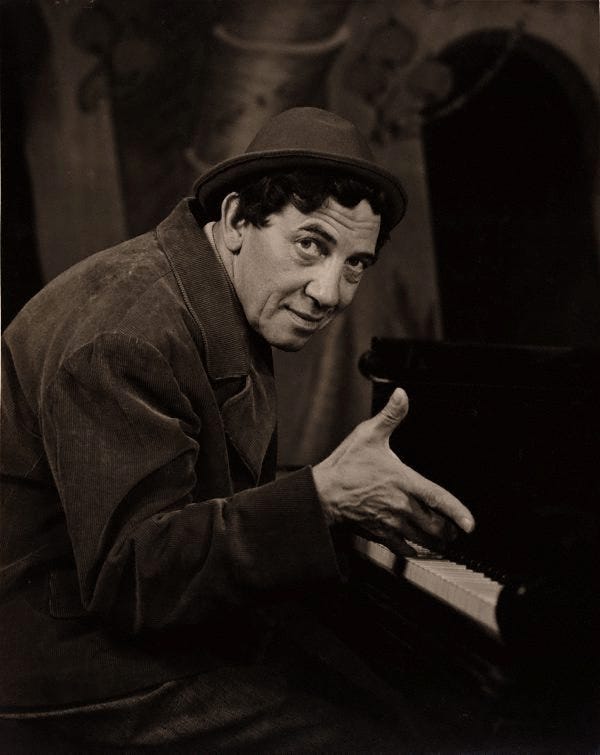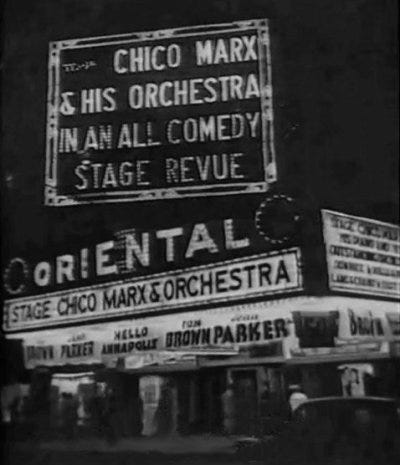You may be wondering why a journey with The Marx Brothers starts with, of all things, a song by “The Velvet Fog”, Mel Tormé. Well, in the Fall of 1942, the 17-year-old Mel Tormé made his debut with the Chico Marx Orchestra. But more on that later….
My son and I were just in NYC for the weekend. When in the city, I like to stay in the Lower East Side. One of the reasons is you can walk down the street, past City Hall, and right onto the Brooklyn Bridge. As I stroll along, I always find myself singing Sammy Cahn’s song The Brooklyn Bridge. Over that weekend, I had the opportunity to meet up with an old friend, Jeff Butcher. In the 1970s, Jeff and I grew up in White Bear Lake, Minnesota. He was my best friend.
I have written before in my jazz journey about Jeff and how he was a huge Marx Brothers fan. Jeff really kindled my love for the movies. It was from these early movies that I discovered the sound of jazz. As junior high school kids, we became part of the Marx Brotherhood by joining the Marx Brothers Fan Club - mixing it up with a bunch of University of Minnesota college students.
By the way, what’s the password?
Following a common theme of the past few weeks, The Marx Brothers really got their start in vaudeville on the B. F. Keith Circuit. Here’s a lobby card from their 1917 Orpheum Circuit days.
Known at that time as The Four Marx Brothers, they went from vaudeville to the Palace Theater in New York, to legitimate Broadway hits, and then on into movies, where they made 13 films together. Their first film was The Cocoanuts, filmed in 1929 for Paramount Pictures.
There are so many great musical numbers from The Marx Brothers movies. I particularly like this one from their 1932 Paramount movie Horse Feathers because it features Bert Kalmar and Harry Ruby’s song Everyone Says I Love You. All four brothers perform the song in this clip - my favorite is perhaps Groucho at the end strumming his guitar.
Another classic is Alan Jones and Kitty Carlisle (from To Tell the Truth fame) singing Nacio Herb Brown and Arthur Freed’s song Alone from their 1935 MGM movie A Night at the Opera. You can skip ahead to the 1:48 minute mark to just hear Alan Jones’ beautiful singing - still gives me goosebumps.
Here is Alone sheet music, signed by The Marx Brothers:
Chico on Piano
The Marx Brothers grew up poor in turn of the century New York City on the Upper East Side of Manhattan, on East 93rd Street off Lexington Avenue. Leonard Marx or Chico was the oldest of the Marx Brothers.
Here is some cool, early sheet music from a song written by Chico.
Whenever I watch a Marx Brothers movie, I look forward to Chico’s piano solos. He had so many good ones that it is difficult to pick one out, but I think I like this one best, again from A Night at the Opera:
Chico always had aspirations to form his own orchestra; and in 1942 with the help of the great Chicago drummer and bandleader Ben Pollack, he established the Chico Marx Orchestra.
Mainly focusing on stage shows, Chico’s orchestra did release two records on The Hit Record label in 1942.
His orchestra consisted of a 16-man band and a vocal group. The lineup changed sporadically during its existence, but in the fall of 1942, Mel Tormé joined the group as a singer and vocal arranger. The orchestra also included the great guitarist of West Coast Jazz fame, Barney Kessel.
According to Mikael Uhlin's Marxology, at age 19 Kessel moved from Muskogee to Los Angeles in search of fame and fortune. Some local musicians told him about a rooming house for musicians not far from the bus station. There was nobody there when the phone rang in the hall, so Barney answered it. They were looking for the guitar player. Kessel said "I am the guitar player", went down for the audition, and landed his first job with Chico.
Kessel said, “We played a lot of theaters, we did the Roxy in New York. We played the Blackhawk restaurant for four months in Chicago, and when Chico did his numbers - his stage show - he would lead the band, we'd play with him". After touring for a year, Kessel settled in Los Angeles. He later played with band leaders like Charlie Barnet, Benny Goodman, Artie Shaw, and Charlie Parker, before hitting the big-time at Contemporary Records with The Poll Winners.
The Chico Marx Orchestra was, however, short-lived and broke up in July 1943 after playing at the Golden Gate Theatre in San Francisco.
Harpo on Harp
Adolph Marx or Harpo was the second-oldest of the Marx Brothers.
He wasn't exactly a scholar and dropped out of school (literally) when two classmates threw him out the window of his second-grade class. He went to work alongside his brother Chico to contribute to the family income, working odd jobs selling newspapers, working in a butcher shop, and as an office errand boy.
Along with Chico’s piano playing, I loved hearing Harpo play the harp. What I think is interesting about Harpo is that he was a self-taught harpist. According to Harpo’s son, Bill Marx:
“My dad taught himself how to play the harp... as an adult. His mom sent him one when he was in his twenties and told him to learn it. So he did. He didn't get lessons and he didn't know how to read music. One thing my dad figured out pretty early on - it's relatively easy to play glissandos (those showy runs that go up and down the scales... and the strings) on the harp. And glissandos look impressive when you watch a harpist play one. Watch his early movies and you'll see him do that a lot in his own, unique, self-taught way.
But there's something else you can learn from watching him play the harp in his movies... beginning with "The Cocoanuts" in 1929 and ending with "Love Happy" in 1949. Dad gets a lot better at playing as time goes on. I think this is because Dad really loved playing the harp and he did it constantly. He'd practice for two or three hours every day.”
Harpo has so many great harp solos from their movies: Blue Moon from At The Circus and his song from Go West are probably my favorites. But, I’d like to feature Alone from A Night at the Opera, since it followed in the film directly after the Chico piano solo I featured above.
A Nod to the Duke
Ivie Anderson was Duke Ellington’s first full-time singer and perhaps his best vocalist.
In his book, Music is My Mistress, Duke wrote, “In addition to her great singing, Ivie was also considered a good-luck charm. We opened at the Oriental Theatre on Friday, February 13, 1931, and we broke the all-time house record. We returned to the Oriental on Friday, March 13, 1931, and broke that record, too. At the Palladium, our act was No. 13 on the bill. They still talk about Ivie, and every girl singer we’ve had since has had to try to prevail over the Ivie Anderson image.”
Remarkably, Ivie Anderson appeared in The Marx Brothers’ film A Day at the Races, singing the number All God's Chillun Got Rhythm. The song was written especially for her in 1937 by Walter Jurmann, Gus Kahn (songwriter on Fred Astaire’s Flying Down to Rio), and Bronisław Kaper. It was nominated for the short-lived Academy Award for Best Dance Direction, only given from 1935 to 1937.
Another little-known fact is that a young Dorothy Dandridge, who would later pave the way for subsequent generations of black actresses, appeared in this dance number. Dandridge started out as a nightclub singer and actress in supper clubs in the 1930s and '40s and made appearances at swanky hot spots like The Cotton Club and The Apollo Theater.
Also, the dance team from the number was the great Whitey’s Lindy Hoppers of Harlem’s Savoy Ballroom.
This film clip is such an important document of the awesome dancers of the Savoy Ballroom of that time and reflects the living spirit of Jazz. Along with Blues, I think jazz music and jazz dancing are America’s greatest folk expression, after all, it gave its name to an epoch - The Jazz Age. You can clearly see how Whiyney’s Lindy Hoppers even influenced the UK’s Jazz Dance groups like Manchester’s Jazz Defektors, who in the mid-1980s were an important part of the Jazz Dance scene created by the innovative DJs, Colin Curtis and Paul Murphy. For more on that go here.
I am dedicating this week’s journey to Jeff - thanks for all those great movie memories and for the hours at the St. Paul Library digging for answers to the Liberty magazine quiz contest….
Next week, that Big River called Jazz takes us on a journey with the obscure, but not insignificant jazz pianist, Richard Twardzik.
If you like what you’ve been reading and hearing so far on our journey and would like to share this with someone you think might be interested in learning more about our great American art form: Jazz, just hit the “Share” button at the bottom of the page. Also, if you feel so inclined, become a subscriber to my journey by hitting the “Subscribe” button here:
Also, find my playlist on Spotify: From Fred Astaire to Sun Ra.
Feel free to contact me at any time to talk shop. I welcome and encourage that….
Until then, keep on walking….


















